

What is sustainable development? The evolution of the idea. Throughout the evolution of the concept of “sustainable development” there was consensus on the fact that it does not focus solely on environmental issues.
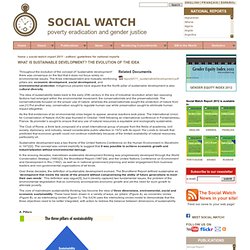
The three interdependent and mutually reinforcing pillars are: economic development, social development, and environmental protection. Indigenous peoples have argued that the fourth pillar of sustainable development is also cultural diversity. The idea of sustainability dates back to the early 20th century in the era of industrial revolution when two opposing factions had emerged within the environmental movement: the conservationists and the preservationists. The conservationists focused on the proper use of nature, whereas the preservationists sought the protection of nature from use.[1] Put another way, conservation sought to regulate human use while preservation sought to eliminate human impact altogether. As the first evidences of an environmental crisis began to appear, several reactions took place. A. Source: B. C. Nic Marks: The Happy Planet Index. Development Practice. Newsfeeds. Untitled. Alternative to "first world", "second world" and "third world"
Milanovic, B.: Worlds Apart: Measuring International and Global Inequality. We are used to thinking about inequality within countries--about rich Americans versus poor Americans, for instance.
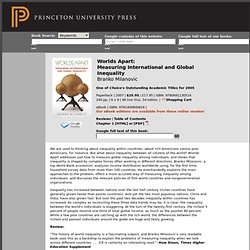
But what about inequality between all citizens of the world? Worlds Apart addresses just how to measure global inequality among individuals, and shows that inequality is shaped by complex forces often working in different directions. Branko Milanovic, a top World Bank economist, analyzes income distribution worldwide using, for the first time, household survey data from more than 100 countries. He evenhandedly explains the main approaches to the problem, offers a more accurate way of measuring inequality among individuals, and discusses the relevant policies of first-world countries and nongovernmental organizations. Inequality has increased between nations over the last half century (richer countries have generally grown faster than poorer countries). Review: "Branko Milanovic makes a difficult subject remarkably accessible.
State of World Population 2007 - Online Report: United Nations Population Fund. Realistic Policies for Urban Expansion What will it take to put some sort of order into large-scale urban expansion?
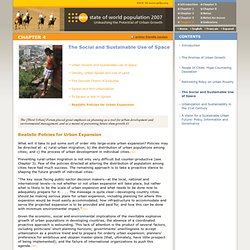
Policies may be directed at: a) rural-urban migration; b) the distribution of urban populations among cities; and c) the process of urban development in individual cities.(42) Preventing rural-urban migration is not only very difficult but counter-productive (see Chapter 3). Few of the policies directed at altering the distribution of population among cities have had much success.
The remaining approach is to take a proactive stance to shaping the future growth of individual cities: “The key issue facing public-sector decision makers—at the local, national and international levels—is not whether or not urban expansion will take place, but rather what is likely to be the scale of urban expansion and what needs to be done now to adequately prepare for it. . . . Happiness is a warm gun: planetary quality of life maps. The subjectivity when it comes to quality of life indicators and of the criteria used to chose them to create a diagnosis of the happiness situation, on a planetary scale, produce rather uneven results, that are living proof of the subjectivity with which we face what's really important for our happiness and the ease with which, with some craftiness and art, the treatment and presentation of these indicators, favouring the criteria that best fits their purpose, can influence public opinion.
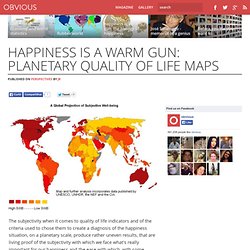
Adrian G. Documentation: TUM-IAS. Location: Sophiensaal, Sophienstr. 6, Munich Curator: Christian WerthmannTUM-IAS Hans Fischer Senior Fellow (TUM Institute for Advanced Study), Professor of Landscape Architecture and Design, Leibniz University Hannover Hosted by: Regine Keller, TUM in collaboration with UN-Habitat Supported by: UN-Habitat – Claudio Acioly Jr., Head Capacity Development Unit, Housing & Urban Management ExpertTUM Institute for Advanced Study (TUM-IAS) – Director Gerhard AbstreiterInternational Center, TUMDFG - Deutsche Forschungsgemeinschaft TUM Graduate School - Graduate Center Architecture Bayerische Architektenkammer CAD-Solutions – Graphisoft Bruns Pflanzen-Export GmbH & Co.
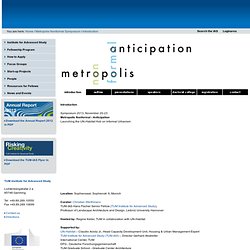
KG Südhausbau KG. Regularizing Informal Settlement in Latin America. Informal settlements – the shantytowns, favelas, and makeshift neighborhoods built as illegal occupations of public or private land -- are a fact of life in cities in both Latin America and most other developing regions.
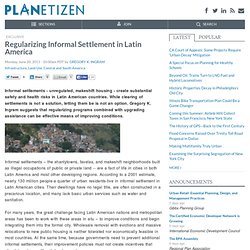
According to a 2001 estimate, nearly 130 million people-a quarter of urban residents-live in informal settlement in Latin American cities. Their dwellings have no legal title, are often constructed in a precarious location, and many lack basic urban services such as water and sanitation. For many years, the great challenge facing Latin American nations and metropolitan areas has been to work with these areas in situ – to improve conditions and begin integrating them into the formal city. Wholesale removal with evictions and massive relocations to new public housing is neither tolerated nor economically feasible in most countries. A favela in Rio de Janeiro, Brazil.
Global Economics. Aid & Development. An urban sustainability, green building, and alternative transportation community. The New Zealand Department of Internal Affairs : Resource material : Sustainable Urban Development : Setting the Scene. Critical Questions for 2012. From international security and regional study to global challenges, CSIS experts will address many of the world's most difficult policy concerns and critical questions in 2012.
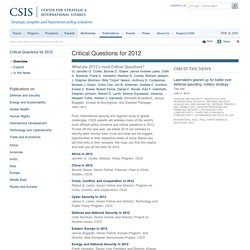
To kick off the new year, we asked 25 of our scholars to identity what worries them most and what are the biggest opportunities in their respective areas of study. Below you will find links to their answers. We hope you find this helpful and wish you all the best for 2012. Africa in 2012Jennifer G. Cooke, Director, Africa Program, CSIS China in 2012Bonnie Glaser, Senior Fellow, Freeman Chair in China Studies, CSIS. Urban Strategy. SustainableCities.net. The Cities Programme. Gnarlyplanning.com.